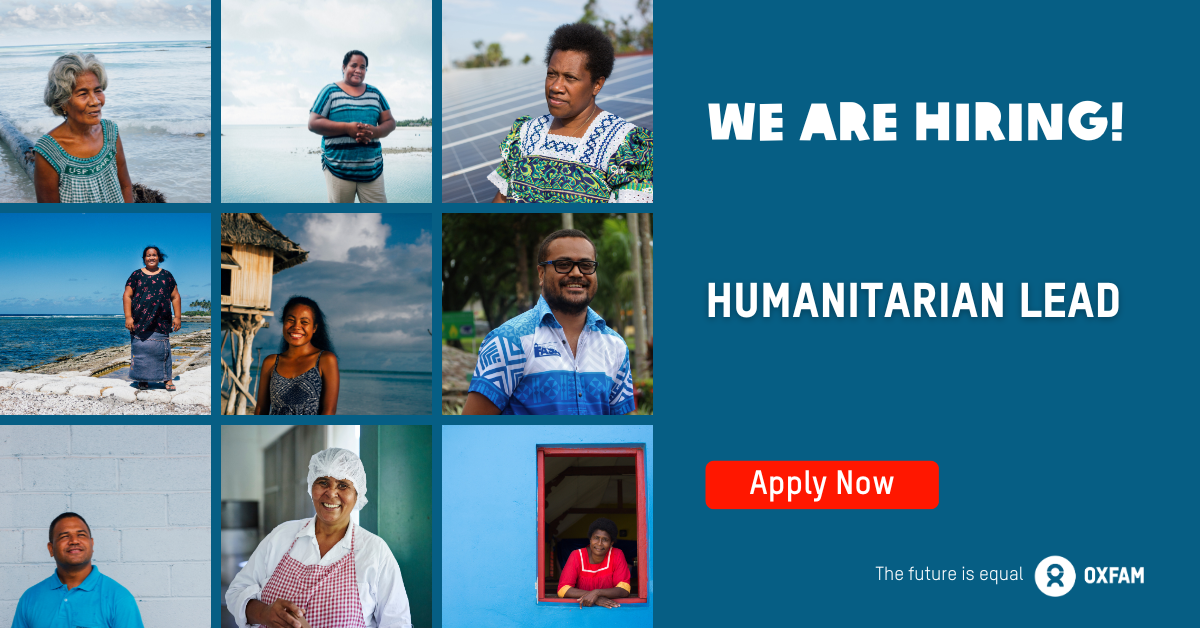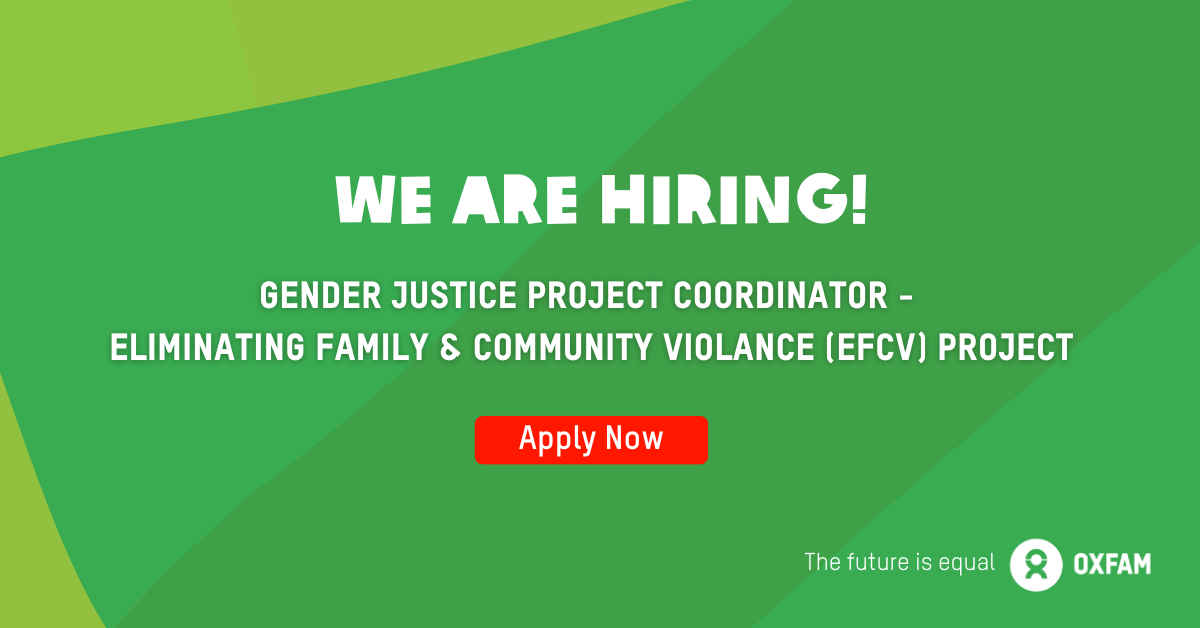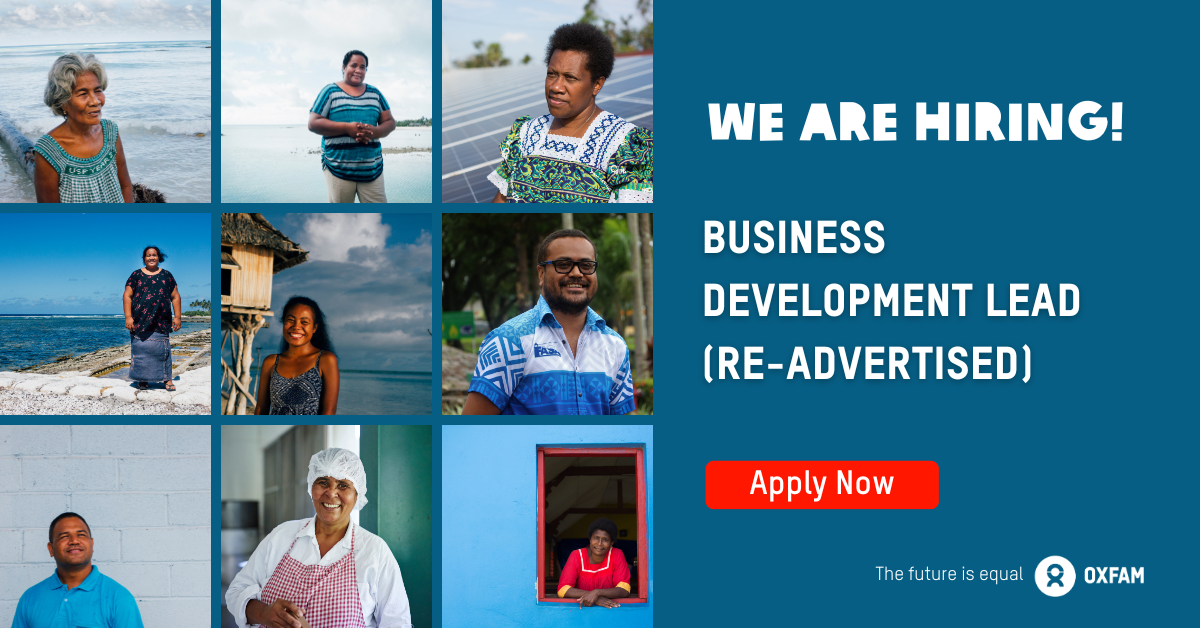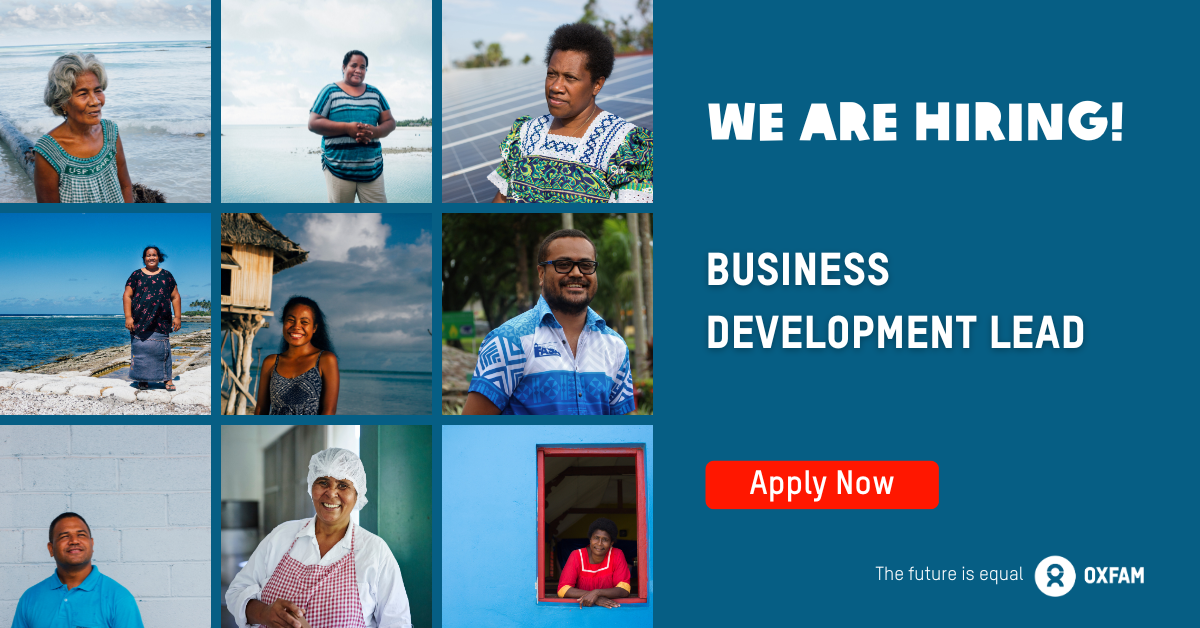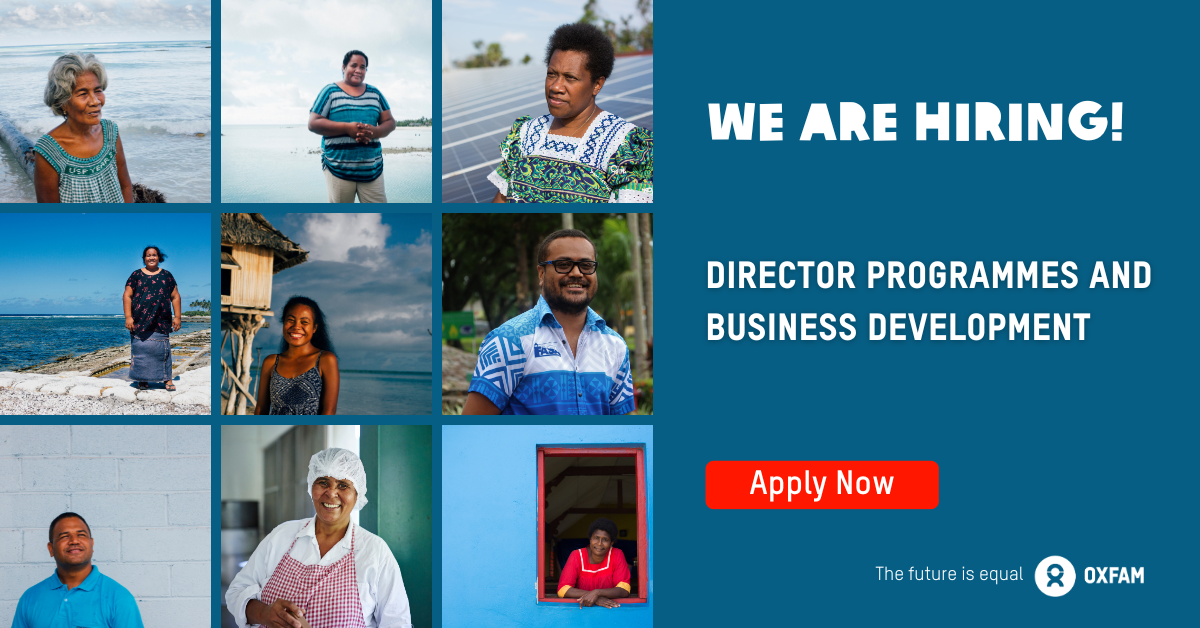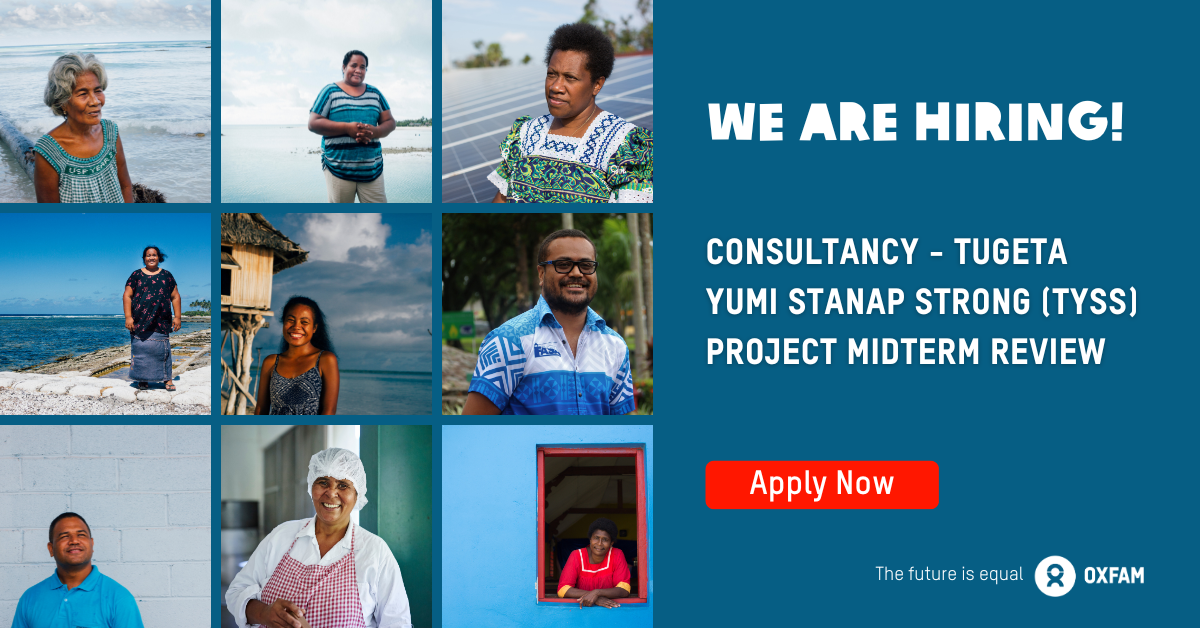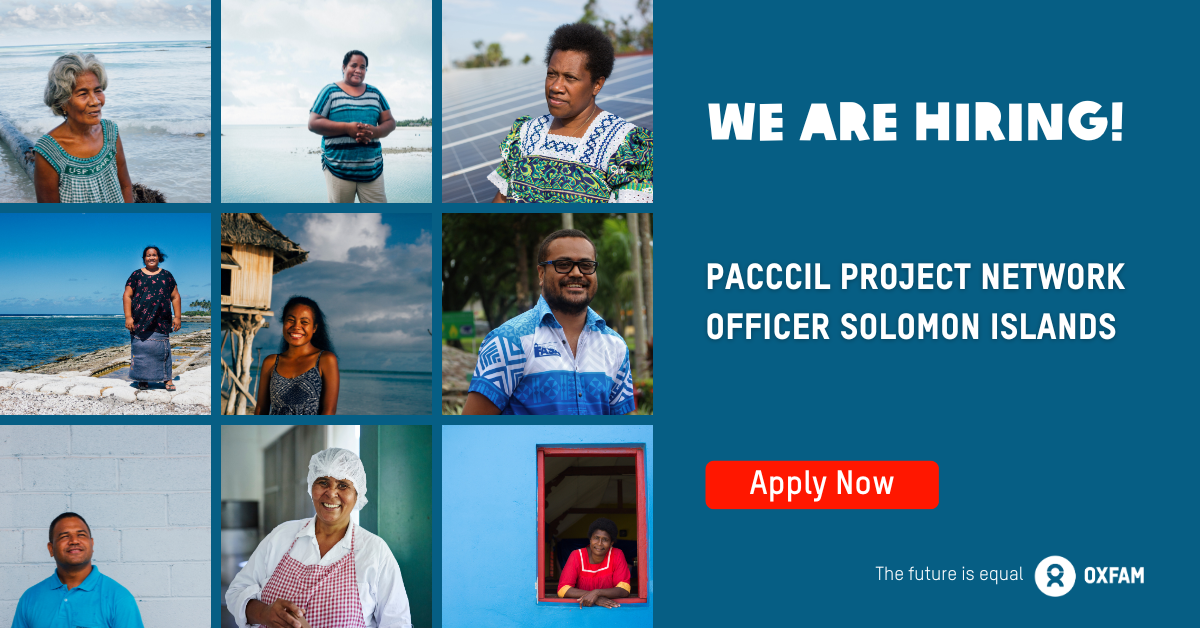- Expressions of Interest close on: Monday 10 July 2023 (5pm FJT – GMT+12)
- Location: Flexible within the Pacific region, preferably in Pacific Island Countries.
- Term: 1 year (fixed term contract with possibility of extension based on funding and performance)
- Reporting to: Director Programs & Business Development
- Please contact Recruitment Coordinator, Divono Vakatale on email for any queries: [email protected]
- All applications must be lodged online via https://oxfampacific.bamboohr.com/careers/245
Job Purpose
To provide strategic vision, expert technical advice, capacity development and leadership in the region to ensure that Oxfam and its partners are both ready and able to respond in a timely, effective, respectful, and technically competent manner to humanitarian emergencies, wherever and whenever they occur in the region. The role will champion local humanitarian leadership at the regional level, making space for local humanitarian leaders and civil society voices in humanitarian and disaster risk reduction forums, with an emphasis on women, diverse sexual orientations and gender identities, and people with disabilities.
The Humanitarian Lead role will need to operate at both Oxfam confederation’s strategic level and operational levels in responses, engaging stakeholders, and building relationships and networks from the local, regional to global levels
Context
Oxfam is a world-wide aid and development organisation that mobilises the power of people against poverty working through staff and local partner organisations across the Pacific to combat gender, economic and climate injustice, including in situations of crisis. Oxfam in the Pacific works to support the following countries in the region: Papua New Guinea, Vanuatu, Solomon Islands, Fiji, and the Polynesia/Micronesia country cluster comprising of Samoa, Tonga, Tuvalu, Cook Islands, Niue, Kiribati, Palau, Nauru, the Federated States of Micronesia (FSM), Republic of the Marshall Islands (RMI). Country teams operate with a mix of direct implementation and via partners, the goal being to increase strategic partnerships where appropriate. This position offers an exciting opportunity to be part of and contribute to the evolution of Oxfam in the Pacific and lead in progression of Oxfam’s local humanitarian leadership model with a strong emphasis on influencing ways of working in the region.
Oxfam supports grassroots humanitarian leadership for effective, locally owned, and driven disaster prevention, response, and recovery. Oxfam is an innovative leader in the Pacific, designing and developing exciting new cash-based humanitarian programmes. As an advocacy organisation, Oxfam also holds a unique position amongst INGOs, working with Pacific governments, donors, multilateral and regional organisations to improve humanitarian approaches and policies.
Our work is guided by Oxfam’s global values and by Pacific values and culture including openness, flexibility, respect, equity, justice, solidarity, collaboration, sharing and humility.
Core Responsibilities:
Program Speciality
Humanitarian Strategy:
- Develop and lead implementation of Oxfam’s humanitarian strategy for the Pacific region.
- Convene, coordinate, and advise Oxfam Country Emergency Teams and partner organisations to strengthen humanitarian plans, policies, partnerships, and practices at country and regional level.
- Participate and represent Oxfam in key regional humanitarian forums with Governments, UN, and other international agencies.
- In consultation with thematic pillar leads, develop systems and deliver training for the deployment of Pacific staff to support Oxfam’s humanitarian responses (Business Support roles, Gender in Emergencies, Safeguarding, MEAL, Cash and Vouchers).
Technical Leadership
- Lead Oxfam’s humanitarian team in the Pacific, convening humanitarian focal points and leads within country teams and at affiliates to ensure effective coordination of Oxfam’s humanitarian capacity across the region.
- Advise Humanitarian Focal Points on operational coordination matters.
- Work closely with Oxfam and local partner staff at country level to develop humanitarian capacities and skills, through training, mentorship, simulation exercises, deployment rosters.
- Broker humanitarian deployments of personnel from within the Oxfam confederation (GHT, affiliates, country-to-country) and external organisations as appropriate.
- Provide technical advice in one or more of Oxfam’s core humanitarian competencies – Water Sanitation and Hygiene (WASH), Emergency Food Security, Vulnerable Livelihoods (EFSVL), Gender, Protection or Cash and Vouchers, with Cash and Vouchers, Social protection technical competencies being most aligned with Oxfam in the Pacific’s humanitarian strategy
- Assist and provide capacity development in the design of new strategies at local, country, and regional level to address issues related to Oxfam’s core competencies. This should include specific program initiatives as well as more broad-ranging strategies aimed at influencing institutional agendas, policies, and practices (governmental, UN, donor, and others) in favour of effective Gender, protection, WASH and Cash and Voucher implementation.
Emergency Preparedness:
- Develop and lead implementation of Oxfam’s humanitarian preparedness plan in the region.
- Maintain and deliver a regular humanitarian induction and training programme and facilitate access to technical training opportunities for Oxfam and local partner staff across the Pacific.
- Map and manage Oxfam’s prepositioned stock and humanitarian equipment in the region.
- Work with country teams and local partners to identify and build a portfolio of humanitarian/resilience partners from governments, civil society and private sector and ensure appropriate investments in their preparedness and collective planning.
- Develop Oxfam-specific partnership resources and tools (partnership agreements, training modules, accessible guidance documents, policies, and good practice guides) for local partner capacity development.
- Coordinate training sessions and workshops in order to achieve the objectives set in the strategy, especially to provide staff with training and leadership on contingency planning and emergency response.
- Support and provide capacity development to country program staff in their ongoing analysis of humanitarian trends through the provision of research and data analysis tools.
- Provide regional oversight and capacity development around humanitarian research, data, trends, and conditions.
Humanitarian Response
- Activate Emergency Management Teams (EMTs) at country-level.
- Liaise with EMTs to identify and facilitate access to additional resource, personnel, equipment, and technical needs.
- Lead operational responses to multi-country events.
- Provide ‘first off the rank’ deployment surge support to country teams for major disaster events.
- Convene meetings of the Pacific Oxfam Humanitarian Team (POHT) to share information, coordinate support actions and identify resources to support country EMTs.
- Enable scaled-up response, lead process of assessment, program design and resourcing, preparation of concept papers and funding proposals, in consultation with both the Humanitarian Focal Point in country, affiliates, the Director Programs and Business Development, and GHT.
- Serve as primary point of contact for all Pacific humanitarian operations and the GHT.
- Monitor Oxfam’s humanitarian operations to ensure Humanitarian Principles, Oxfam Minimum Standards and Requirements, Oxfam Code of Conduct, safeguarding guidance and international good practice standards (Sphere, CHS) are adhered to.
- Collaborate with the Humanitarian Focal Point, Director Programs and Business Development, advocacy staff and the GHT to develop advocacy strategy and content.
- Ensure Gender Sensitivity, disability inclusion, Safe Programming are incorporated into the design, targets, monitoring and evaluation of all responses in the Pacific.
Program Quality
- Ensure that Oxfam’s humanitarian work in the region adheres to relevant policy commitments and minimum standards and to promote these, including:
- Humanitarian Principles.
- The SPHERE and Core Humanitarian Standard (CHS).
- The Oxfam Code of Conduct and related policies (One Oxfam Child Safeguarding Policy, PSEA Policy; Sexual Diversity and Gender Identity Rights Policy; Oxfam Ethical Content Guidelines).
- Oxfam Minimum Standards and Requirements for humanitarian action.
- Oxfam Safeguarding Core Standards.
- Ensure that humanitarian protection analysis is conducted and mainstreamed in programming.
- Ensure that gender analysis is a core component of all humanitarian program development
- Ensure effective feedback and accountability systems are in place for every response and monitor feedback and response.
- Ensure that systematic program review, monitoring, evaluation, and learning are in place so that lessons learnt are documented and shared for cross-program learning in the region (and beyond) and inform future responses, through adequate dissemination and inclusion in potential training.
Humanitarian Advocacy
- Represent Oxfam in Pacific regional humanitarian and Disaster Risk Reduction forums and key regional clusters (WASH, Protection, Food Security).
- Develop and maintain networks of local humanitarian organisations to mobilise joint advocacy campaigns and policy initiatives across Pacific countries.
- Develop evidence-based research products to support Oxfam’s humanitarian advocacy.
- Lead Oxfam in the Pacific’s advocacy efforts in modelling new ways of working and promoting local humanitarian leadership.
- Lead Oxfam in the Pacific’s local humanitarian leadership mandate through advocacy efforts to create systemic change.
Business Services
- Support the development of the regional humanitarian strategy, with a focus on ensuring sufficient capacity and humanitarian experience in business support functions (Finance, Human Resources, Administration, Information Management).
- Maintain an overview of humanitarian program finances in the region, including annual budgeting for “plannable” humanitarian response work within regional budgets.
- Develop and manage the regional humanitarian budget and ensure effective and efficient expenditure of the same, including recoveries from response budgets, where appropriate.
- Work autonomously with significant financial, human resource, security, and representational responsibility.
Management
- Line management of humanitarian staff to ensure humanitarian performance targets and professional development considerations are included in Performance Management cycle.
- Undertake all job responsibilities in a manner consistent with all Oxfam Human Resources policies and procedures.
- Participate in Oxfam performance management activities as both a staff member and, where appropriate, as supervisor.
- Mitigate against risks with medium impact to the organisation and raises high level or complex risks to line manager.
- Ensures the security and safety of Oxfam staff, stakeholders, and property.
Representation and Relationships
- Build relationships with external stakeholders and allies including donors, government representatives and other civil society organisations to increase influencing impact.
- Represent Oxfam in the Pacific to external stakeholders, and high-level networking aptitude.
- Support the Regional Director in external representation, regional level representation and external engagement as required.
Professional Attributes
- Ability to lead complex multi-affiliate project teams and also to work as a member of a team and autonomously.
- Familiarity working with Pacific governments, civil society organisations and faith communities.
- High level of self-awareness, ability to work under pressure and commitment to meeting deadlines.
- Understanding of and commitment to Oxfam in the Pacific’s humanitarian and development philosophy, principles and objectives, and policies.
- Understanding of the practical significance of gender issues in humanitarian environment
- Understanding of and commitment to adhere to gender equity, diversity, child safety and staff health and wellbeing principles.
- Clear ability to transfer knowledge to others.
Skills & Experience:
- Extensive experience of managing and/or coordinating humanitarian response work in a range of environments – including field-level management of complex humanitarian response programs and all phases of the program cycle.
- Experience engaging in high-level policy discussions around global and regional humanitarian issues, initiatives, frameworks, and standards (localisation, Gender in Emergencies, Global Compact, C4C, Sphere, CHS, FRDP).
- Demonstrable skills in gender analysis in humanitarian response or preparedness programming, and a clear.
- Experience working with cash and voucher modalities in humanitarian response an asset.
- Demonstrable experience of policy development in relation to humanitarian response work.
- Experience of identifying training needs and coordinating training implementation.
- Demonstrated facilitation, coaching and capacity development skills.
- Demonstrated financial management skills.
- Demonstrated high level written and oral communication skills in English.
- Very strong analytical and strategic thinking skills; able to understand highly complex issues and translate them into simple, workable actions and plans.
- Excellent interpersonal and presentation skills.
- Training in Disaster Preparedness/Emergency Response.
QUALIFICATION:
Tertiary qualification in Management, Climate Change, Disaster Management, International Development, or similar relevant areas.
Safeguarding
Oxfam is committed to preventing any type of unwanted behaviour at work including sexual harassment, exploitation and abuse, lack of integrity and financial misconduct; and committed to promoting the welfare of children, young people, and adults. Oxfam expects all staff and volunteers to share this commitment through our code of conduct. We place a high priority on ensuring that only those who share and demonstrate our values are recruited to work for us.
Child Safeguarding
As an agency undertaking work both nationally and internationally and in humanitarian response, Oxfam in the Pacific takes its duty of care seriously to safeguard children and recognises that it must meet community expectations and the trust placed in its personnel to maintain the highest standards of conduct with children. Therefore, all are required to understand and comply with the Child Safeguarding Policy, Code of Conduct, toolkit, and Social Media User Policy.
This role requires Oxfam representation when occasionally visiting the field (overseas and domestic).

